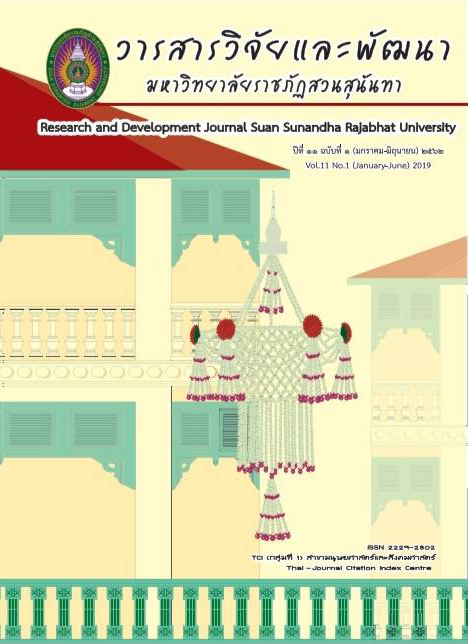การพัฒนารูปแบบการสร้างจิตสำนึกความเป็นพลเมืองแก่เยาวชน ในพื้นที่ 5 อำเภอชายแดนจังหวัดตาก
DOI:
https://doi.org/10.53848/irdssru.v11i1.159279คำสำคัญ:
การพัฒนารูปแบบ, จิตสำนึกความเป็นพลเมือง, เยาวชน 5 อำเภอชายแดน, จังหวัดตากบทคัดย่อ
งานวิจัยนี้มีวัตถุประสงค์เพื่อศึกษาปัญหา ความต้องการ การพัฒนารูปแบบและประเมินรูปแบบการสร้างจิตสำนึกความเป็นพลเมืองแก่เยาวชนในพื้นที่ 5 อำเภอชายแดน จังหวัดตาก เป็นการวิจัยผสมผสานวิธี มีขั้นตอน 3 ขั้นตอน (1) การสอบถามปัญหาและความต้องการสร้างจิตสำนึกจากบุคลากรทางการศึกษาโดยวิธีการสุ่มตัวอย่างแบบแบ่งชั้น และคำนวณกลุ่มตัวอย่างแต่ละชั้นอย่างเป็นสัดส่วน จำนวน 400 คน 2) การสัมภาษณ์การสร้างรูปแบบจากผู้เชี่ยวชาญโดยวิธีการเลือกตัวอย่างแบบเจาะจง จำนวน 5 คน (3) การประเมินผลคุณภาพของรูปแบบจากผู้เชี่ยวชาญโดยวิธีกากรเลือกตัวอย่างแบบเจาะจง จำนวน 8 คน วิเคราะห์ข้อมูลทั้งเชิงปริมาณและเชิงคุณภาพ ผลการศึกษา พบว่า 1) ปัญหาจิตสำนึกความเป็นพลเมืองฯ เยาวชนมีปัญหาในระดับปานกลาง ด้านที่มีปัญหาสูงที่สุด ได้แก่ ด้านความรับผิดชอบต่อตนเอง ผู้อื่นและสังคม รองลงมาได้แก่ ด้านการเคารพสิทธิ เสรีภาพและกฎกติกาของสังคมที่เป็นธรรม ด้านการเคารพในศักดิ์ศรีของความเป็นมนุษย์ และต่ำที่สุด ได้แก่ ด้านความเข้าใจระบอบประชาธิปไตยและการมีส่วนร่วม 2) ความต้องการสร้างจิตสำนึกความเป็นพลเมืองฯ พบว่า บุคลากรต้องการสร้าง (1) จิตสำนึกการเคารพศักดิ์ศรีความเป็นมนุษย์ให้เกิดขึ้นแก่เยาวชน (2) การเคารพสิทธิ เสรีภาพและกฎกติกาของสังคม (3) ความรับผิดชอบต่อตนเอง ผู้อื่นและสังคม และ (4) ความเข้าใจระบอบประชาธิปไตยและการมีส่วนร่วมตามลำดับ 3) รูปแบบการสร้างจิตสำนึกความเป็นพลเมืองฯ พบว่า รูปแบบควรมี 4 องค์ประกอบ 5 ขั้นตอน ส่วน 4) ผลการประเมินรูปแบบ พบว่า องค์ประกอบของรูปแบบมีความเหมาะสมและความเป็นประโยชน์อยู่ในระดับมากที่สุด มีความเป็นไปได้อยู่ในระดับมาก โดยทุกขั้นตอนของรูปแบบมีความเหมาะสม ความเป็นไปได้และความเป็นประโยชน์อยู่ในระดับมากที่สุด
เอกสารอ้างอิง
Jantawan, N. (2016). Democratic Citizenship: A Case Study of Undergraduates at the Main Campus of Ramkhamhaeng University. Academic Journal Phranakhon Rajabhat University. 7(1). pp.103-113.
MGR Online. (2018). Tragically… alien teenagers drank, sniffed the glue, hit each other. MGR Online. Available on [March 18, 2018], from [https://www.mgronline.com.]
Pakapol, P. and Angkavanich, M. (2017). Project-Based Learning using Service Learning Activities for Democratic Citizenship. Veridian E-Journal, Silpakorn University. 10(3). pp.975-990
Petpanya, J. (2018, 25 May). Expert Level Teacher. Interview.
Samakoses, V. (2011). Citizenship Education. Matichon. Available on [March 8, 2017], from [https://www.varakorn.com.]
Siridhrungsri, P. (2017). Civic education development. Suthiparithat. 31(100). pp.103-113.
Tontisuntorn, T. (2014). Citizenship, Human Right and Democracy. Bangkok: Policy study Institute under Foundation for enhance policy study.
Udompong, L. (2018). Civic/citizenship Education to Promote the Role of Citizens in Politics Agent Systems: A Sustainable Approach through Foreign Experiences. Research and Development Office, King Prajadhipok's Institute. Available on [April 26, 2018], from [http: //kpi.ac.th.]
Viphatphumiprathes, T. (2013). Democratic citizenship of Dhurakij Pundit university students. Research. Bangkok: Dhurakij Pundit University.
Wongyai, V. (2011). Curriculum and learning innovation to citizenship. Bangkok: R. and print Co.
ดาวน์โหลด
เผยแพร่แล้ว
รูปแบบการอ้างอิง
ฉบับ
ประเภทบทความ
สัญญาอนุญาต
บทความที่ได้รับการตีพิมพ์เป็นลิขสิทธิ์ของ สถาบันวิจัยและพัฒนา มหาวิทยาลัยราชภัฎสวนสุนันทา
ข้อความที่ปรากฏในบทความแต่ละเรื่องในวารสารวิชาการเล่มนี้เป็นความคิดเห็นส่วนตัวของผู้เขียนแต่ละท่านไม่เกี่ยวข้องกับมหาวิทยาลัยราชภัฎสวนสุนันทา และคณาจารย์ท่านอื่นๆในมหาวิทยาลัยฯ แต่อย่างใด ความรับผิดชอบองค์ประกอบทั้งหมดของบทความแต่ละเรื่องเป็นของผู้เขียนแต่ละท่าน หากมีความผิดพลาดใดๆ ผู้เขียนแต่ละท่านจะรับผิดชอบบทความของตนเองแต่ผู้เดียว





